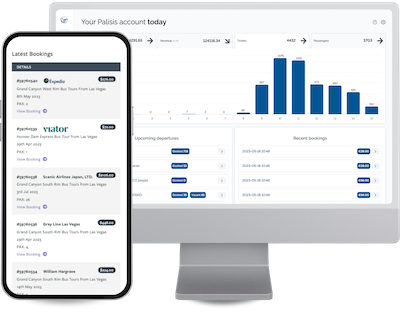Overbooking has long been a challenge for the tourism and transportation sectors. Whether it’s a highly sought-after tour or a popular ferry route, selling too many tickets can lead to disappointment, customer dissatisfaction, and logistical issues. Modern technology, however, offers a way to combat this problem: real-time updates.
Real-time updates allow tour operators to monitor and manage their bookings as they happen, significantly reducing the risk of overbooking. By embracing systems that integrate real-time data across all sales channels, tour operators can optimise their operations while ensuring a smoother experience for their customers.
This article explores how real-time updates can help tour operators avoid overbooking, enhance customer satisfaction, and improve efficiency, supported by insights and real-world examples from businesses that have already made the switch.
The challenges of overbooking
Overbooking occurs when more bookings are accepted than the available seats or spaces, a common practice across the tourism industry. Many businesses overbook as a safety measure, assuming that a portion of customers will not show up. However, this practice can backfire when more customers than expected do arrive, leading to logistical challenges, cancelled services, and unhappy customers.
For operators, overbooking is more than just an inconvenience. It can result in lost revenue, customer dissatisfaction, refund requests, and, worse, a damaged reputation. Word-of-mouth reviews, particularly in the age of social media, can quickly spread negative feedback, which may affect future business.

One of our clients, a ferry operator, faced recurring overbooking issues during peak tourist seasons. Without a real-time booking system, they couldn’t ensure that all sales channels had up-to-date availability. This led to disappointed passengers and constant refund requests. However, once they implemented real-time updates through Palisis, the problem was resolved. As their operations manager shared, “We no longer worry about overbooking, and customer complaints have decreased dramatically.”
How real-time updates solve overbooking
Real-time updates prevent overbooking by ensuring that booking information is instantly updated across all platforms. When a customer books a ticket, whether through the company website, a third-party agent, or an on-site kiosk, the availability is immediately adjusted to reflect that transaction.
For businesses selling through multiple channels, such as online travel agents (OTAs) or tour resellers, maintaining accurate availability is key to avoiding conflicting bookings. With real-time systems, any changes in inventory are communicated across all platforms, ensuring no more tickets are sold than are actually available. This not only reduces overbooking but also prevents operational chaos.
An example of this comes from one of our sightseeing bus tour clients. They faced regular overbooking during high-demand periods, which led to customers being turned away at the last minute. After switching to Palisis’ real-time booking system, they saw a significant drop in overbooking incidents and an increase in positive customer feedback. The operations manager noted, “The real-time updates made all the difference. We no longer need to deal with last-minute cancellations, and our customers leave happy.”
Improving customer satisfaction
Real-time updates don’t just prevent overbooking—they also improve the overall customer experience. When customers know their booking is secure, their confidence in the business increases. A reliable booking process builds trust, which is crucial for retaining customers and attracting positive reviews.
One Palisis client, a luxury yacht operator, had struggled with overbooking before implementing real-time updates. For their high-end clientele, seamless service was a must, and overbooking could easily tarnish their reputation. After adopting a real-time booking system, they noticed a significant improvement in customer satisfaction. Their marketing director said, “Our clients expect flawless service, and Palisis’ real-time updates help us deliver exactly that. We’ve seen a huge improvement in our feedback.”
Real-time updates ensure customers get accurate information and can trust that their bookings will be honoured, leading to smoother operations and greater customer loyalty.

Maximising operational efficiency
Beyond preventing overbooking, real-time updates also contribute to overall operational efficiency. Having access to accurate, live booking data enables operators to make informed decisions about resource allocation. For example, if a tour is filling up quickly, operators can adjust staffing levels, add additional vehicles or guides, or even implement dynamic pricing to maximise revenue.
Real-time data also allows businesses to monitor when availability is running low. This insight helps operators manage their inventory better, reducing the need for last-minute adjustments and helping them make proactive decisions. For companies that rely on fluctuating demand, like seasonal tours or events, this is a significant advantage.
Combining real-time updates with dynamic pricing
Many businesses have found that combining real-time updates with dynamic pricing offers even greater benefits. As availability decreases, prices can automatically adjust based on demand. This combination allows businesses to maximise revenue while ensuring that overbooking is avoided.
For instance, one of our tour operator clients adopted both real-time updates and dynamic pricing to manage their bookings more efficiently. They saw a 15% increase in revenue during peak seasons as prices adjusted dynamically based on availability, all while maintaining customer satisfaction and avoiding overbooking.
Case study: Sightseeing bus tour operator
One of our key success stories comes from a sightseeing bus tour operator. Prior to using real-time updates, they regularly overbooked during high season, which resulted in frustrated customers and a hit to their online reviews. The operations team struggled to manage bookings across various platforms, often selling more tickets than the buses could handle.
Once Palisis’ real-time updates were implemented, all booking channels synced immediately, eliminating any chances of overbooking. This change led to fewer customer complaints, and the operator saw a 20% increase in positive online reviews within six months. Their operations manager shared, “The real-time system was a game changer for us. We no longer had to scramble to accommodate extra passengers, and the improvement in customer feedback has been tremendous.”

The future of smart booking
Incorporating real-time updates isn’t just a technical upgrade; it’s a strategic move that can transform the way tour operators manage their bookings. The benefits are clear—reduced overbooking, higher customer satisfaction, improved operational efficiency, and the potential for increased revenue through dynamic pricing.
Tour operators who invest in real-time systems now are positioning themselves for success in an increasingly competitive market. As one Palisis client said, “Real-time updates have made our booking process so much more reliable. It’s improved not only our operations but also our relationship with customers.”
By implementing these systems, businesses can confidently reduce overbooking and provide a seamless experience that keeps customers returning

 Copy link
Copy link

